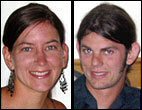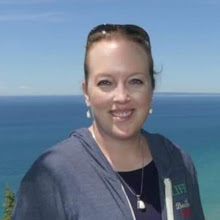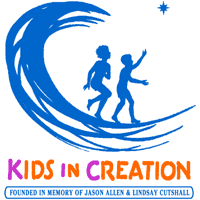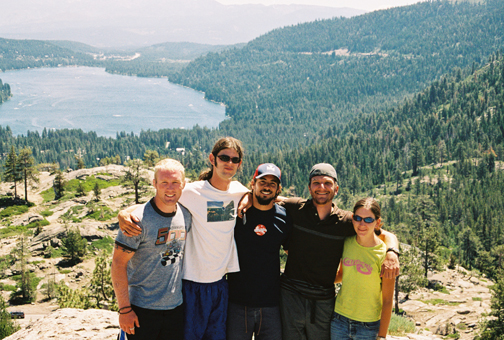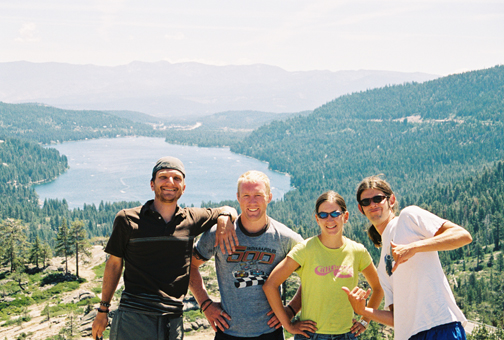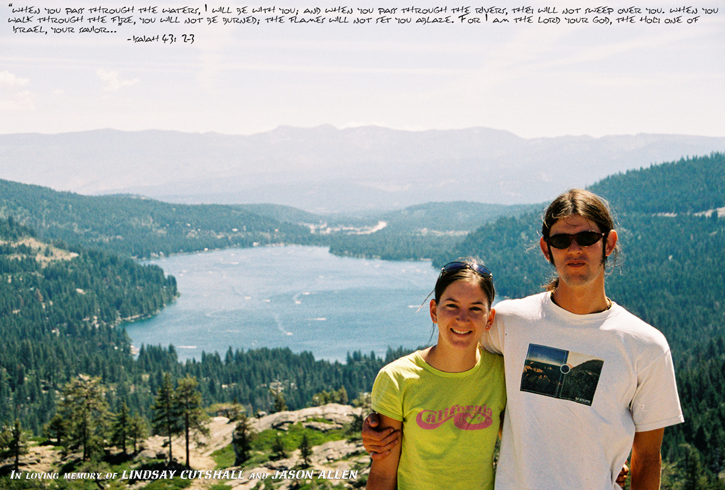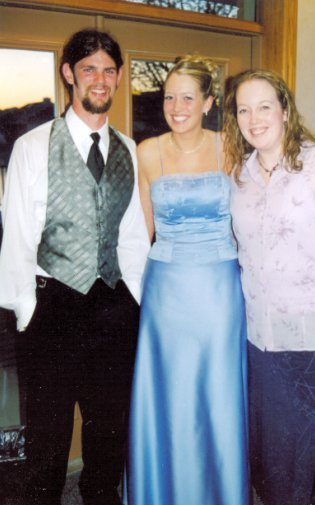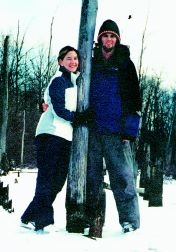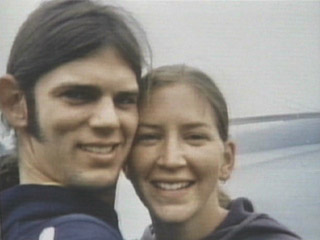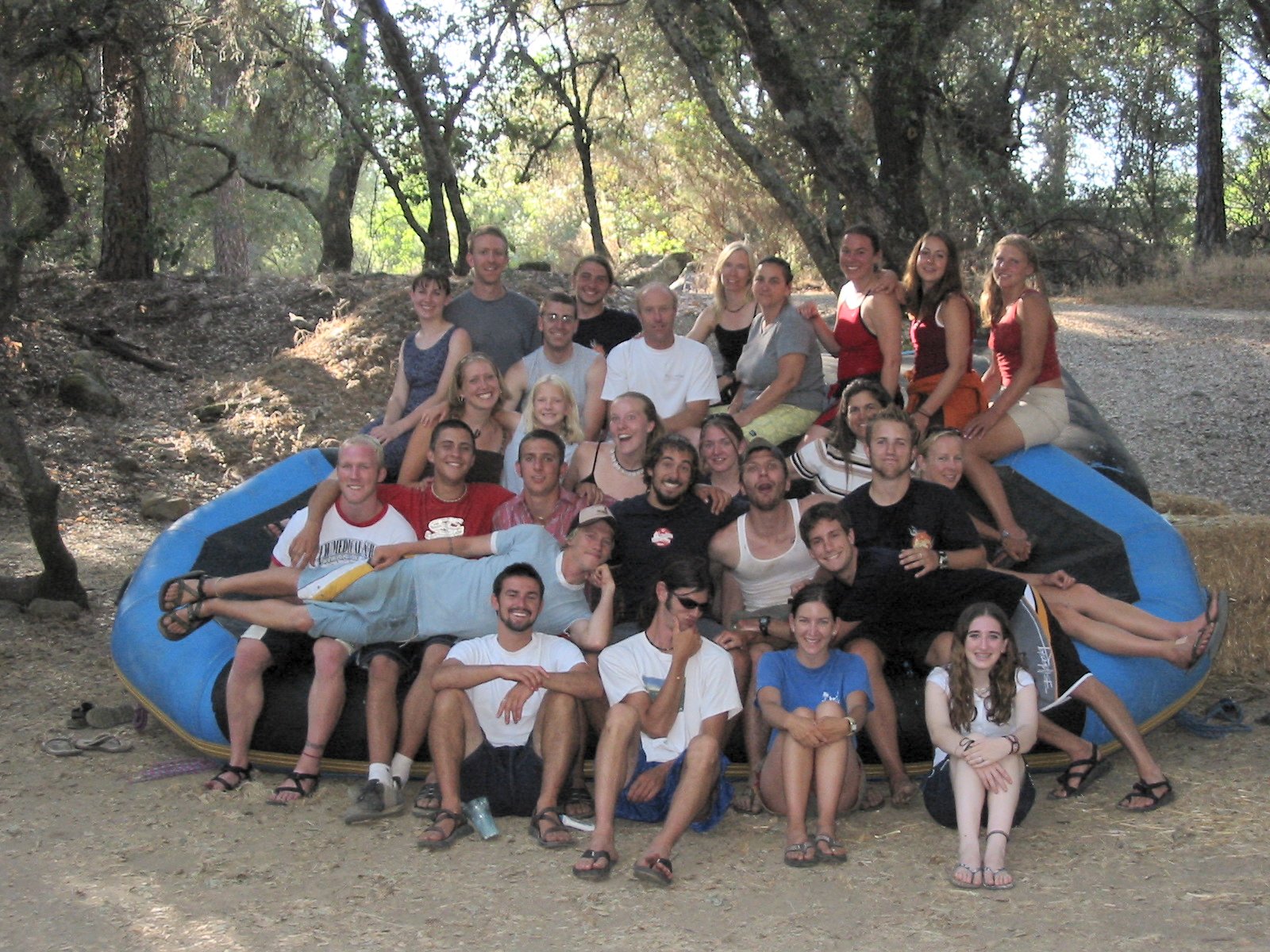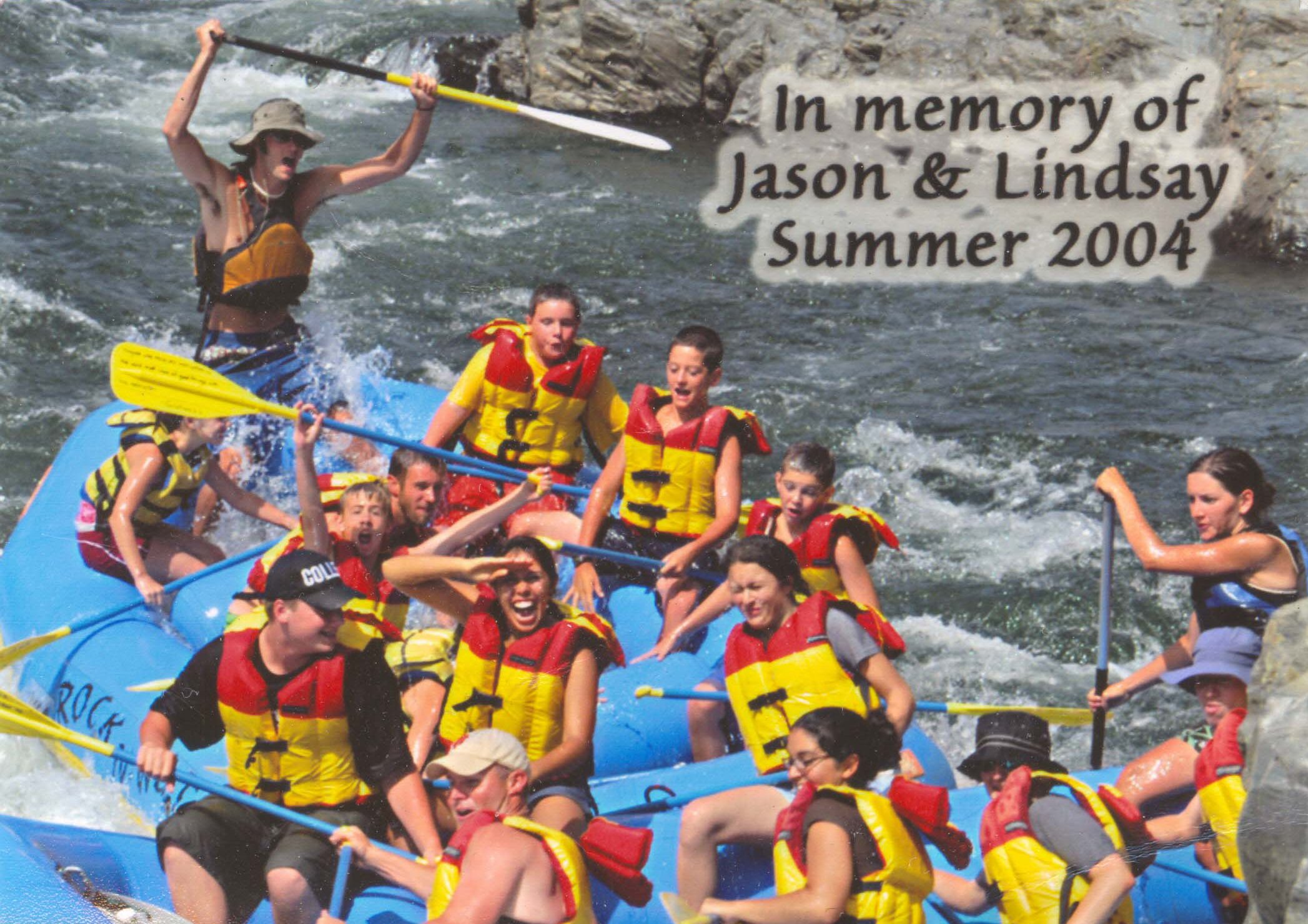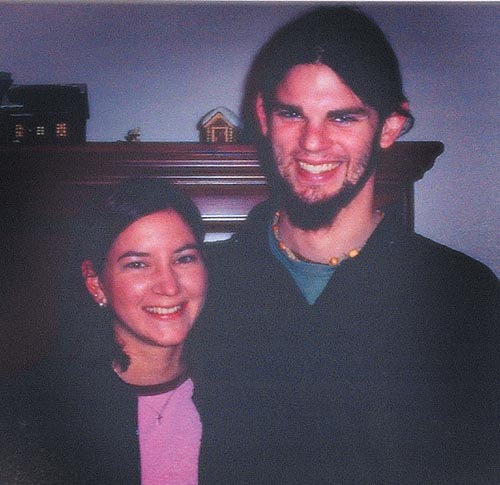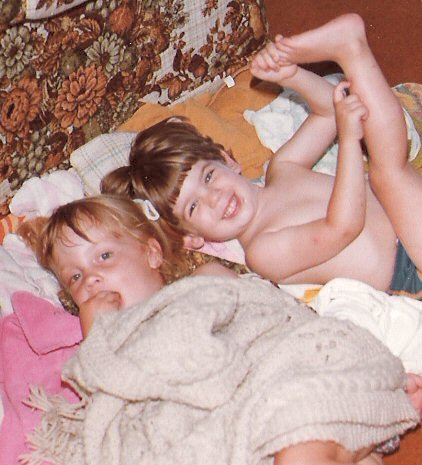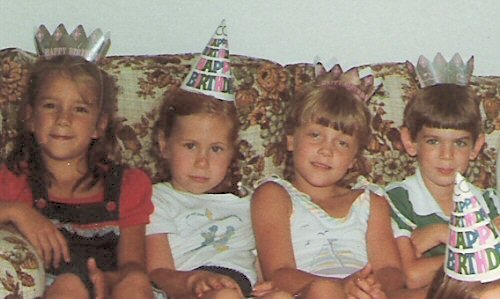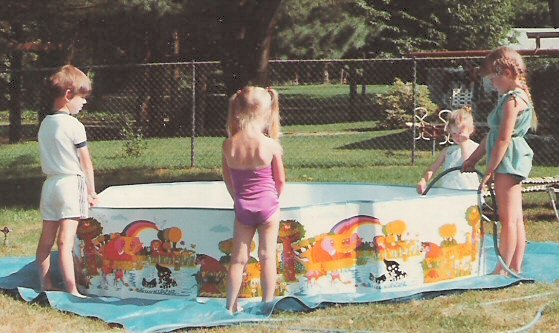In three days, it will be three years since Jason & Lindsay were killed. It's hard to believe it's already been that long... because sometimes it seems like it just happened yesterday. It still frustrates me to no end that whoever killed them is still out there... because my fear is that he will hurt or kill someone else. But the thing is... I'm sure he thinks he's "gotten away with it"... but he hasn't. What he doesn't realize is that you
escape God's judgment, and no matter what happens in his lifetime or our lifetimes, he WILL be judged and held accountable for what he did and there is no escaping it. I refer to the killer as "he" in a collective sense... because it could have been a female or more than one person... but whoever it was will not escape God's justice. God knows who did it and where that beast of a human being resides... and is watching every move and seeing every thought. No matter where he goes, God is watching.
even extends to the worst of sinners... such as this killer. As hard as it is for me to offer such grace... it really is not up to me. If Jason & Lindsay's killer sought God's grace and forgiveness and authentically repented for what he did... God would forgive him and wipe the slate clean. This does not mean, however, that there would be no consequences for his actions. To accept forgiveness also means to accept responsibility
consequences. But if their killer was forgiven by God, he would be a changed person and would be humble and accepting of his fate... knowing that ultimately he will be spending his eternity in heaven, just as Jason & Lindsay are.
In the meantime, Jason & Lindsay's story is continuing to impact the lives of countless people in very positive ways. I know I have said this many times before, but what I find to be most sweet and touching is the way that God has not let them die in vain, but has used their lives and faithfulness to set an example for the rest of us. In their deaths, He has been glorified because they lived their lives to serve Him and He was very pleased with that. I have been inspired to make major life changes because of their example -- and in their memory, I have gotten more involved at my church... in Bible studies and other ministries, as well as community outreach... because I want to serve others for Christ like Jason & Lindsay did. I will NEVER forget them and the amazing role models they were and continue to be. They would be so humbled by all of this -- but glad, as long as God is receiving
of the glory from it. :)
comparing Jason & Lindsay's case to another cruel and similarly senseless double-murder that took place 35 years ago. These same cases were featured together the last time America's Most Wanted aired Jason & Lindsay's story:
Did a killer strike twice in 32 years?
The cases, 750 miles apart, are eerily similar: unwed couples, secluded beaches, gunshots, Bibles.Sunday, July 22, 2007
By Peter H. King -- Times Staff Writer
Tofino, Canada — "For man is born for trouble, and sparks fly upward." — Job 5:7
--

This goes back 35 years. Yet what happened on Radar Beach that summer reverberates even today — kept alive by detectives who came up empty, by living ghosts left behind and, more than anything, by the possibility that three summers ago, on a distant beach in Northern California, it happened again.
The story begins in that tumultuous epoch known collectively as the Sixties. Each summer, the west coast of Vancouver Island was swarmed by thousands of American draft resisters, hippies, Jesus freaks, nudists and assorted other shaggy-haired foot soldiers of the era. In short, it was a scene.
Makeshift lean-tos, shacks and tents covered the run of rugged beaches south of Tofino, now a popular tourist destination, but then a quiet village of fishing families and loggers. Drugs were everywhere, and shoplifting in town was epidemic. Most of the visitors traveled around by thumb.
Ken Gibson, a retired dock builder, would often pick up hitchhikers "if they didn't look too squirrelly, just to talk to them: 'What's this all about? What's the kick? What are you hoping to get out of this?'"

Joseph Henry Burgess came late to Tofino's freewheeling period, arriving on the island in May 1972. Tall, skinny and bearded, the 25-year-old Burgess had fled to Canada from New Jersey in 1968 after failing to report for induction into the Army.
He hung around Canada's eastern cities for a few years. He held down odd jobs. He bounced checks. He trained as a bush pilot. He also, according to a Royal Canadian Mounted Police synopsis of his movements, was not a stranger to drugs.
On his way west, authorities recounted, Burgess purchased a Gevarm rifle, a .22-caliber, semiautomatic that could be fitted with a 20-round clip and broken down to carry in a duffel bag. Later, he bragged about his marksmanship.
Born in Jersey City to a prominent Catholic family, Burgess attended a Jesuit college and taught Bible classes. By the time he reached Vancouver Island, he had plunged headlong into more unconventional spiritual thickets. He had become, as one acquaintance told police, "a Jesus freak."
As a police summary said: "Witnesses that had contact with Burgess at the time stated that he would quote the Bible and speak of the 'Wrath of God,' always ending his conversation with 'Amen.'"
Burgess, who earlier had assumed the surname of Burke, now called himself Job Weeks or just Job — from the Old Testament figure whose faith was so fiercely tested. He moved into a small, one-house Children of God commune in Port Alberni, but barely lasted a week. The Gevarm rifle made his housemates nervous.
So the self-proclaimed "prophet of God" bought some ammo and moved to Radar Beach, a few miles south of Tofino. As he left the commune, he vowed to live as a hermit until he "heard from the Lord." In his week on the beach, according to Canadian police reports, Burgess was seen with outdoor survival manuals. He was seen beside a stream, attempting to teach others to pray. He was seen cleaning his rifle.
He also made a rather awkward, and unsuccessful, pass at a sunbathing woman. "She was in the buff," recalled Dan Creally, a retired Canadian police investigator, flipping through his original case notebooks, "and he was quoting from the Book of Job, and all the while he was sizing her up."
Burgess complained to this woman about a newly arrived couple — young, Christian and unwed — who had set up camp together near the communal water hole back in the woods, a short walk from the beach.
"He did not approve," she told investigators, of their "being together."

About two days after this exchange, the bodies of Ann Barbara Durrant, a Canadian who had just celebrated her 20th birthday, and Leif Bertil Carlsson, a 19-year-old exchange student from Sweden, were found in their camp by the water hole.
Clad in T-shirts and nestled together under a single sleeping bag, they appeared to have been asleep when struck at close range by rounds from a .22-caliber rifle, later determined to be a Gevarm. Durrant had been hit five times, four shots to the head and one that passed through her hand and hip. Carlsson was shot four times, all in the head.
By the time the bodies were found, Burgess was gone. In what appeared to be a hasty evacuation, he left behind a Canadian health card, biblical verses on scraps of paper and a rifle-cleaning kit.
Along the trail leading away from the beach, Mounties also discovered a snapshot of Burgess flashing a peace sign that was torn into pieces, a guitar, prescription glasses, a roach clip, a shoe, a bag of clothes and a Bible. Inscribed in the Bible was the name Job Weeks.
Investigators first presumed that Burgess had killed himself, but his body and rifle were never found. And despite a high-profile manhunt and an international arrest warrant, he was never caught. In time, interest in the case faded; it came to be remembered by locals here, if at all, as one more piece of strange lore from a strange time.
--
Then, three summers ago, on a beach 750 miles to the south, near the tiny Northern California coastal town of Jenner, the bodies of a couple — young, Christian and unwed — were discovered in sleeping bags. Each had been shot in the head with a rifle, apparently at close range.
They had worked that summer as counselors at a Christian camp in California's Gold Country, east of Sacramento. Lindsay Cutshall, 22, was from Fresno, Ohio. Jason Allen, 26, was from Zeeland, Mich. They were to be married in September, with her father, pastor at the nondenominational Fresno Bible Church, presiding.
Cutshall told her mother she wanted to see San Francisco before returning to the Midwest. The couple left the camp at noon Aug. 13 in his red Ford sedan. The next day her credit card was used to purchase hot sauce in a San Francisco gift shop. They headed north. In Sebastopol they stopped at the California Surf Shop and inquired about free camping on the beach.
Owner Bruce Landry said he told them there were no sites where beach camping was permitted, but still suggested a small, secluded spit of sand north of Jenner, at the mouth of the Russian River.
Landry conversed with the couple for about an hour, he recalled. Allen was curious about surfboards. Cutshall admired a display of glass jewelry. They discussed their impending wedding. At one point, Cutshall stood behind Allen, her arms draped around his shoulders.
An outgoing, 58-year-old Vietnam veteran, Landry said he gave Cutshall a necklace with a glass pendant as an early wedding gift, walked the couple to their car and with a hug sent them on their way.
Nearing the coast, the couple stopped at a second surf shop just outside Bodega Bay. This shop was crowded, with maybe 10 customers. Owner Nick Marlow's memory of the encounter has always been a bit vague.
He can remember Allen sticking his head in the door to ask for a second opinion about beach campsites. He told Marlow about the suggestion that they try the beach just north of Jenner. That sounds about right, Marlow said he responded.
He can remember sensing that this young man and woman were Christians, but he cannot remember why. Perhaps it was a T-shirt one of them wore. He can remember that the couple struck him as impatient, butting in on a transaction to press for information.
"What was that all about?" Marlow wondered aloud after Allen and Cutshall had left.
There were other reported sightings, some confirmed, others not. What can be said with tragic certainty is that the pair made it to the place Landry had recommended — a beach alternately called Driftwood or Fish Head.
Strewn with bleached driftwood and other flotsam carried in by the tides, the beach sits beneath a tall bluff, with a spectacular view of rock formations set amid crashing breakers. One of the two snapped a color photograph of the scene at sunset. It was the last shot in their camera.
Cutshall wrote in her journal: "The sun is going down on the horizon, and all I see is the beams shining off the cliff face, and I know that God is awesome. I look around and I see His creation all around me."
In his journal Allen asked simply, "Can life ever be so perfect?"
At some point, they climbed into separate sleeping bags, clothed, their Bibles and religious tracts nearby. They went to sleep. A few days passed before the bodies were found.
Each had been shot once in the head, at a range, a Sonoma County detective said obliquely, that was not "from any significant distance." The weapon was later determined through ballistics work to be a .45-caliber Marlin rifle.
There was no evidence of sexual assault or robbery. The glass necklace that the surf shop owner said he'd given Cutshall apparently was all that investigators could determine might be missing.
A Canadian police officer read a newspaper account of the California murders and showed it to Constable Terry Horrocks, the major-crimes investigator who now maintains the Burgess case file.
"Holy smokes," Horrocks remembered his colleague saying. "How similar does this sound?"
An isolated, difficult-to-access beach not known to a lot of people, an unwed man and woman, shots to their heads from a rifle, Bibles, sleeping bags. "You could take our crime scene in Tofino," Horrocks told the Alberni Valley Times, "and set it right down in California."
The Canadians had theorized for some time that Burgess might have migrated back to the States, traveling under an adopted identity, after draft dodgers were granted a blanket amnesty by President Carter in 1977. They also suspect the Radar Beach killer might be capable of striking again.
"Whatever triggered him in that way," Horrocks said, "if he encountered the same situation, could have triggered him again."
Burgess would have been 57 the summer Cutshall and Allen were killed. Horrocks had an early photo enhanced by computer to project what the fugitive might look like at that age, and released it to the public. He contacted Sonoma County authorities.
The chance the killings might be connected, however remote, excited the denizens of America's true-crime realm. America's Most Wanted aired segments on both sets of murders. In the chat rooms of websites devoted to puzzling out notorious unsolved crimes, buffs still buzz and bicker over the possibilities of a link.
One blog in particular, True Crime Diary, the work of Southern California screenwriter Michelle McNamara, cataloged half a dozen additional cases that bore similarities, a string of unsolved couple murders in woodsy settings spread across the Pacific Northwest and down into Arizona. Some predated the Cutshall-Allen killings. Others came later.
The possibility that whoever killed the pair might have struck before, or again, was not lost on Sonoma County investigators. Lt. Robert Giordano, who supervises the department's detectives, said the Tofino murders and others were "absolutely on our radar."
Sheriff's investigators have consulted, sometimes in person, with agencies across the West, he said, including the Royal Canadian Mounted Police. Yet despite many "commonalities," as Giordano put it, thus far no firm connections have been established between any two cases.
"We have several cases that could be similar," he said. "We can't say for sure if they are or not. Our mind is open to all of them."
At the same time, other possibilities have been explored — that the California killings were tied to a gang initiation rite, that there was a territorial motive tied to this particular stretch of beach, that Cutshall or Allen were mistaken for sleeping seals. Detectives have interviewed as many owners of Marlin rifles in the region as they could identify.
"There have been hundreds of people looked at in this case," Giordano said, "and only a few have been absolutely cleared in it…. Anytime you have an unsolved case, it's because you have a piece missing. I think we're close. We just don't have that one missing piece."
Of all the commonalities shared by the Canadian and Californian cases, the most intriguing is what the Canadian police Constable Horrocks calls the "religious component." On Radar Beach, authorities alleged, Burgess was motivated by a belief that unwed couples sleeping together deserved God's wrath.
On Fish Head beach, Cutshall and Allen were not "sleeping together" in the euphemistic sense. An autopsy determined that there had been no sexual violation in the attack and also, according to her father, that Cutshall was "pure."
Yet it is conceivable that a killer so motivated might have mistaken innocent gestures of affection as a prelude to something more: "Perception," said Giordano, "is exactly the issue."
--
Creally, the Canadian investigator initially in charge of the Radar Beach case, is 72 years old and retired, yet he shares with other Mounties a frustration that they never got their man.
"This is the only homicide case I ever investigated," Creally said, "that I couldn't put together."
The beginning days of the investigation proved difficult, sorting out witnesses who were flighty to begin with, who tended to look and dress alike, who often knew one another only by first names and who, as often as not, were zonked on drugs.
"The first few days after the bodies were found looked bleak, really bleak," Creally told the Alberni Valley Times early on.
Even before the murders, the West Coast scene was fading. The government had begun to roust squatters in preparation for creating Pacific Rim National Park. Word that a double murderer was loose, however, certainly hastened the end of Vancouver Island's turn as Woodstock West.
"They were all leaving when they heard about this," said Bruce Michelson, a Mountie stationed in Tofino at the time. "They were totally, absolutely freaked."
Despite all the obstacles, the Canadian police officers rather quickly managed to identify and track down everybody who had been on Radar Beach at the time of the killings. Within a week, Burgess was identified as the prime suspect, and his obsessive views about premarital sex were declared to be the motive.
It was believed that Burgess hitched a ride into Port Alberni and later caught a ferry to the Canadian mainland. A hotelier in the port town of Nanaimo described renting a room for one night to someone who looked like Burgess but who checked himself in as John Stewart of Portland, Ore., and said he was bound for Europe or Africa.
Creally suspected then, and still does, that Burgess, given his Jesuit schooling, might have sought sanctuary in a seminary. The investigator wanted to circulate a flier about the case among the priesthood. "Ottawa," he said, referring to the Royal Canadian Mounted Police headquarters, "didn't like that idea."
After about a year, Creally temporarily left the Canadian police. He passed along the Burgess file with a recommendation that contact be maintained with the suspect's family in the States.
"I always thought that if he was still alive," Creally said, "the family had to have some contact with him."
How aggressively this suggestion was followed is not clear.
There were scattered reported sightings of Burgess. In the early 1970s, a woman bumped into someone who looked like him at a party. He was spewing Scripture in a way that, Horrocks said, "freaked her out."
In 1978, on the Blackfoot Trail near Alberta, someone else reported encountering a bearded, barefoot man "preaching the Bible and praising the name Jesus."
The barefoot preacher, a police interview report said, tried to bum a cigarette, and when his request was rebuffed, the man identified as possibly being Burgess "advised the witness that he would pray to Jesus to forgive his sins."
As the trail went cold, the investigation turned into something of a maintenance task. The file was reviewed once a year, a report written, and that was about it.
--
In October 2001, a brief obituary in the Jersey Journal reported the death of Anne Marie Burgess, the suspect's mother. She had died in Asbury Park, N.J., where the family had lived for 40 years. She was in her 90s. The obituary listed three surviving children, daughters June Ann Anderson and Maureen Burgess and a son — one Joseph Henry Burgess.
Anderson, it turned out, lives in a rustic, gated community on the Tassajara River, in the hills that separate the Salinas Valley and Monterey Peninsula. An American flag hangs outside her cabin.
"He's not here," she hollered from the front door to a reporter who had come to ask about her brother. She grabbed a straw sunhat, unlocked a chained gate and led her visitor to a chair on the porch.
Anderson wore a blue bathrobe and dark glasses framed in white plastic. She spoke in a slow, halting voice. She said that she never heard about any murders — "you are telling me things I don't know" — and that she couldn't remember when her brother left for Canada.
She insisted that not once had anyone from law enforcement asked her about her brother, who was — or is — five years older than she.
"We were very close," she said. "We called him Jo Jo. He loved to play chess. He was very smart. He was brilliant. He was a very good brother to me. He was my brother, and I loved him very much. I loved him very much."
She stopped to correct herself.
"I don't want to speak about my brother in the past tense. I want to say, I love him very much."
Would she like to see him caught?
She recoiled: "I don't like that word. 'Caught.' I would like to see him come back."
His absence had been hard on all of the family, she said, her mother in particular, like a death in the family.
"There is no answer," she said. "There are only questions. Like, where is he?"
--
For Pastor Chris Cutshall, the loss of his daughter Lindsay on a California beach was not something like a death in the family. It was a death — unexpected, unexplained, unresolved. The grieving has not ended, and he scoffed at the notion of closure.
At the same time, he and his wife, along with Allen's parents, have demonstrated a remarkable calm that comes from their conviction that their children went to sleep that night and, as Pastor Cutshall would eulogize, presiding over a memorial rather than a marriage, "woke up in the arms of Jesus Christ."
Shortly after the killings, the Cutshalls responded to a letter of condolence sent by the people of Jenner. The couple wrote that they did not blame the town for what happened, and added: "Perhaps we can visit your fair community some day." In the same letter, they quoted the Old Testament:
"For man is born for trouble, and sparks fly upward."
Chapter 5, verse 7. The Book of Job.
"If you have ever seen a campfire," the pastor explained, "there are sparks that fly up out of that — inevitably. I think this is true of us too. While on planet Earth, this hard planet we live on, we are going to have tribulations and trials. And we Christians are not immune."
--
Maureen Burgess, two years older than her brother, still resides in the tidy, two-story bungalow near the shore in Asbury Park where the family moved in 1961. She too flies an American flag over the porch. Unlike her sister, she did not want to talk about her brother.
Had anyone in the family ever heard from Joseph over the years, she was asked. A postcard, a telephone call, anything?
"I have nothing to say to you," Burgess said.
Her view was that the business involving her brother was old news, that it was done with and ought to be dropped. Why are you writing about this now, she demanded. Told there had been similar cases, she snapped back: "All cases are similar.
"You don't think about what you do to the people who are left behind," she complained.
No one has been so absolutely left behind as Geoffrey Durrant, the father of the young woman killed on Radar Beach. A retired English professor, Durrant is 93 now, hard of hearing but otherwise fit and trim.
He comes to the door of his town house outside Vancouver in stocking feet, jeans and a blue shirt buttoned to the top. He moves to the living room, snaps his hearing aids into place and, speaking softly, begins to retrace the ripples of pain that rolled out from Radar Beach.
"Of course," Durrant begins, "it changed our whole lives completely. My wife became very full of guilt."
In 1961, the same year the Burgess family moved from Jersey City to Asbury Park, he and his family — wife Barbara, a son and two daughters — left their home in South Africa and headed to Canada. They wanted to escape the system of apartheid and the troubles it created.
More specifically, the parents worried that their son would be drafted into the army and forced, as Durrant puts it, "to shoot down Africans." Canada, it seemed, "promised a haven of peace and freedom."
The decision to move was mutual between husband and wife, but she had suggested it and "felt responsible for a bad decision." Barbara Durrant never overcame her grief. She died eight years ago.
About the same time, Durrant lost his son to heart failure. His last remaining daughter suffers from mental distresses that force them to stay apart. "Her personality is completely destroyed," Durrant says. "And I'm sure that it goes back to this same trauma."
He pauses for a moment, and then stares up with light blue eyes.
"It's dreadful to survive one's own children, you know."
He describes Ann, his slain daughter, as a quiet girl who loved animals and collected porcelain cats. A promising student, she got caught up in the times, dropped out, joined a commune.
"They planted trees, that sort of thing," he says. "It caused an estrangement between me and my daughter, which actually was resolved before she was killed. I spoke to her and explained to her that I forgave her, you know, for what she had been doing. I did not want to continue to be hostile to her activities."
After the murder, Durrant was preoccupied with trying to hold his family together. He assumed that the killer must have been on drugs and that he would be caught.
"I thought it was just a matter of arresting him," he recalls now, 35 years later. "I was astonished nothing happened. My wife was devastated."
In his view, his daughter's murder was a sinister product of the era of "hippiedom," as he calls it. He issues his indictment in a torrent, expressing "a profound sadness about the whole business of hippiedom, you know. The whole drug culture, the whole false innocence. It's a radical betrayal of everything that civilization stands for. And so eagerly embraced by so many people. The whole flower child business, you know?
"False innocence, turned so nasty."
As for the man accused of killing his daughter, Durrant says that there was a time when he was eager to see him put to death. That time has passed.
"I would just like him to be confronted with his responsibility," the father says, a slight spark of heat rising in his voice. "That's all."

